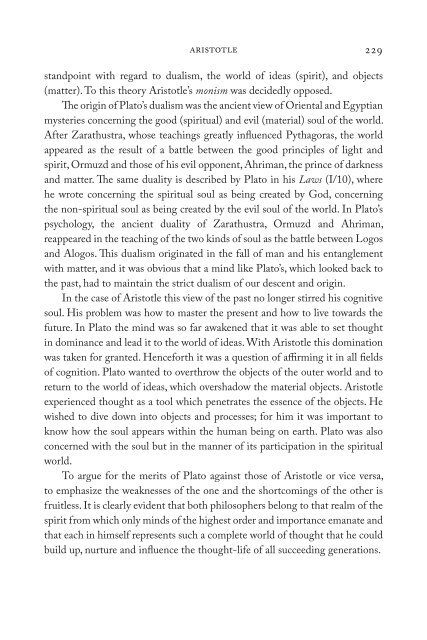The Gospel of Hellas - Research Institute for Waldorf Education
The Gospel of Hellas - Research Institute for Waldorf Education
The Gospel of Hellas - Research Institute for Waldorf Education
Create successful ePaper yourself
Turn your PDF publications into a flip-book with our unique Google optimized e-Paper software.
aristotle<br />
standpoint with regard to dualism, the world <strong>of</strong> ideas (spirit), and objects<br />
(matter). To this theory Aristotle’s monism was decidedly opposed.<br />
<strong>The</strong> origin <strong>of</strong> Plato’s dualism was the ancient view <strong>of</strong> Oriental and Egyptian<br />
mysteries concerning the good (spiritual) and evil (material) soul <strong>of</strong> the world.<br />
After Zarathustra, whose teachings greatly influenced Pythagoras, the world<br />
appeared as the result <strong>of</strong> a battle between the good principles <strong>of</strong> light and<br />
spirit, Ormuzd and those <strong>of</strong> his evil opponent, Ahriman, the prince <strong>of</strong> darkness<br />
and matter. <strong>The</strong> same duality is described by Plato in his Laws (I/10), where<br />
he wrote concerning the spiritual soul as being created by God, concerning<br />
the non-spiritual soul as being created by the evil soul <strong>of</strong> the world. In Plato’s<br />
psychology, the ancient duality <strong>of</strong> Zarathustra, Ormuzd and Ahriman,<br />
reappeared in the teaching <strong>of</strong> the two kinds <strong>of</strong> soul as the battle between Logos<br />
and Alogos. This dualism originated in the fall <strong>of</strong> man and his entanglement<br />
with matter, and it was obvious that a mind like Plato’s, which looked back to<br />
the past, had to maintain the strict dualism <strong>of</strong> our descent and origin.<br />
In the case <strong>of</strong> Aristotle this view <strong>of</strong> the past no longer stirred his cognitive<br />
soul. His problem was how to master the present and how to live towards the<br />
future. In Plato the mind was so far awakened that it was able to set thought<br />
in dominance and lead it to the world <strong>of</strong> ideas. With Aristotle this domination<br />
was taken <strong>for</strong> granted. Hence<strong>for</strong>th it was a question <strong>of</strong> affirming it in all fields<br />
<strong>of</strong> cognition. Plato wanted to overthrow the objects <strong>of</strong> the outer world and to<br />
return to the world <strong>of</strong> ideas, which overshadow the material objects. Aristotle<br />
experienced thought as a tool which penetrates the essence <strong>of</strong> the objects. He<br />
wished to dive down into objects and processes; <strong>for</strong> him it was important to<br />
know how the soul appears within the human being on earth. Plato was also<br />
concerned with the soul but in the manner <strong>of</strong> its participation in the spiritual<br />
world.<br />
To argue <strong>for</strong> the merits <strong>of</strong> Plato against those <strong>of</strong> Aristotle or vice versa,<br />
to emphasize the weaknesses <strong>of</strong> the one and the shortcomings <strong>of</strong> the other is<br />
fruitless. It is clearly evident that both philosophers belong to that realm <strong>of</strong> the<br />
spirit from which only minds <strong>of</strong> the highest order and importance emanate and<br />
that each in himself represents such a complete world <strong>of</strong> thought that he could<br />
build up, nurture and influence the thought-life <strong>of</strong> all succeeding generations.

















